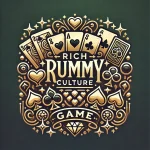
The Complete Guide to Rummy: History, Variations, Strategies, and Community From its inception in the early 19th century, rummy has been a popular card game for centuries. Although the game’s exact origins are still somewhat unknown, it is generally accepted that Rummy developed from earlier card games like the Mexican-originated Conquian. Since the mechanics of combining cards to form sets & runs are similar, Conquian is frequently considered the forerunner of modern Rummy.
The different variations of Rummy that we know today are the result of numerous adaptations made to the game as it traveled across borders. Rummy arrived in the US by the late 1800s and quickly became very popular there, especially with families & social circles. Rummy developed into many different variants as it went along, each with its own distinct set of rules & gameplay elements. Because of its versatility, the game has flourished across cultural boundaries, giving rise to regional variations like Gin Rummy, Indian Rummy, and Kalooki. Late 20th-century technological advancements further ushered Rummy into the digital era by enabling global players to interact and compete through online platforms.
Rummy has evolved from a recreational activity to a competitive sport with tournaments and championships held all over the world. This lengthy history demonstrates the game’s timeless appeal as well as its capacity to evolve and connect with players of all ages. Popular variations. Gin Rummy is one of the most popular variations of Rummy, usually played by two players.
The goal is to minimize the number of points in unmatched cards while forming sets & runs. A favorite among competitive players, this fast-paced game is distinguished by its strategic depth. favorites in the area. Another well-liked variation is Indian Rummy, which is played with two decks of cards.
A pure sequence devoid of any jokers must be one of the minimum number of sequences that players must create. This version places a strong emphasis on strategic planning & adept card management. Another fascinating variation that has become popular in different areas is Kalooki, which adds elements like the use of wild cards and particular melding card rules. Investigating Various Play Styles.
Contract Rummy & Oklahoma Rummy are two other noteworthy variants, each with its own set of rules tailored to the preferences of various players. In addition to keeping the game interesting and novel, Rummy’s diversity enables players to experiment with various tactics and play styles. For both novice and expert players, taking part in Rummy tournaments can be an exciting experience. A wide variety of people frequently enter these contests, fostering an atmosphere of enthusiasm & friendship.
Players should become acquainted with the tournament structure before beginning, as it can differ greatly from one event to the next. While some tournaments may use a round-robin format, others may use a knockout one. In order to manage one’s gameplay throughout the competition and create strategies that work, it is essential to comprehend the structure. Rummy players must improve their skills via study & practice if they want to succeed in tournaments.
Knowing the different forms of Rummy can give you a competitive advantage because they may call for different tactics. Looking at seasoned players can also provide insightful information about sophisticated strategies and decision-making techniques. Also crucial is mental agility; athletes should develop the capacity to read their opponents’ movements and predict their tactics. Participants can greatly increase their chances of winning at Rummy tournaments by fusing practice with strategic thinking & flexibility.
It is crucial to comprehend rummy etiquette in order to promote a constructive gaming atmosphere and guarantee that each player has a good time. Keeping a respectful attitude toward other players is one of the core dos in rummy culture. This entails recognizing opponents’ abilities, abstaining from disruptive behavior, and being polite when playing. Sportsmanship is crucial; players should be gracious and humble whether they win or lose. Respecting the game and its players is another reason why it’s critical to follow the guidelines set forth for each game variation.
On the other hand, there are a few things that players should avoid doing when playing rummy. The integrity of the game is compromised by cheating or attempts to manipulate it, which can also cause disputes between players. Likewise, too much teasing or other distractions can take away from the concentration needed for strategic gameplay. Also, players should refrain from talking about their hands or strategies while playing because this could give someone an unfair advantage or break the flow of the game.
By following these rules, players can help create a welcoming environment that makes rummy more enjoyable for everyone. Rummy mastery calls for a combination of psychological awareness, flexibility, and strategic thinking. Keeping a mental record of the cards that have been played is a useful tactic that can reveal important details about opponents’ hands & possible melds.
Players are able to choose which cards to keep or discard with knowledge thanks to this awareness. A solid foundation for victory can also be established early in the game by forming sets and runs; giving priority to sequences that make use of wild or valuable cards can further increase one’s chances of winning. Knowing when to play aggressively versus when to take a more cautious approach is another essential component of winning at rummy. Discarding valuable cards that could help opponents while simultaneously drawing cards that improve one’s own hand is an example of aggressive play.
On the other hand, a conservative approach might concentrate on gradually creating sequences while paying close attention to the movements of opponents. Finding a balance between these strategies according to the game’s progression can have a big effect on performance. Successful players are ultimately those who maintain strategy flexibility while consistently adjusting to the changing game dynamics. Developing Relationships with Other Fans.
One’s gaming experience can be greatly improved by interacting with other enthusiasts. By interacting with others, whether in online forums or local clubs, players can share strategies, experiences, and advice. Regular gatherings or competitions are held in many communities, allowing players to interact and compete while creating friendships that go beyond the game. Both social media and online platforms. Online platforms have completely changed how players interact with each other, in addition to local get-togethers. Rummy-focused social media groups offer forums for talking about tactics, clarifications of the rules, and forthcoming events.
These platforms are also excellent resources for participating in virtual tournaments or finding partners for online games. Establishing a Network of Support. Through active participation in the community, both online and in person, players can develop a network of support that enhances their comprehension of the game and forges enduring bonds with other fans. Many resources in a variety of media are available for anyone wishing to learn more about Rummy or hone their gaming abilities. Rummy-related books frequently offer in-depth analyses of tactics, variations on the rules, and historical background.
Games like “Rummy: A Complete Guide” provide thorough descriptions of the various kinds of games as well as advice from experienced players. Both novices looking to learn the fundamentals and seasoned players looking to hone their skills can benefit greatly from these resources. Along with books, rummy fans can access a wide variety of websites and mobile applications. Online resources frequently offer tutorials that simplify difficult rules into easily understood formats and give users the chance to practice against AI opponents or actual players from around the world.
Users can play on the go while interacting with friends or participating in competitive matches thanks to apps like “RummyCircle” & “Gin Rummy Plus.”. Players can improve their abilities and remain interested in the constantly changing world of Rummy by utilizing these resources, whether they be digital platforms or reading materials. Like any well-known game, Rummy’s cultural quirks and gameplay mechanics frequently spark debate.
The rules governing melds, particularly the number of sets or runs necessary for a valid hand in various variations, are a frequently asked topic. Knowing the rules before beginning a game can help avoid confusion later on because these requirements are essential for both casual play & competitive settings. The topic of how to handle difficult opponents or unfavorable hands is another common worry. When confronted with players who are skilled and appear to be able to read their moves, players frequently question how to modify their strategies. It becomes crucial to remain composed in these situations; concentrating on one’s own plan rather than obsessing over the behavior of rivals can improve decision-making in general.
Through research or community involvement, these frequently asked questions can be addressed, allowing players to better navigate the intricacies of Rummy and take advantage of everything this favorite card game has to offer. In summary, Rummy is more than just a card game; it’s a complex fabric involving strategy, history, culture, and community involvement. Whether you are interested in Rummy because of its historical origins or because of its contemporary variations and spirit of competition, there is no doubt that it has something to offer everyone, from relaxed family get-togethers to fierce competitions among seasoned pros. You can fully immerse yourself in this classic game that keeps evolving while staying true to its core principles by learning its origins, exploring its many forms, developing strategies, following etiquette, interacting with other fans, making use of the resources available, and answering frequently asked questions through FAQs.




